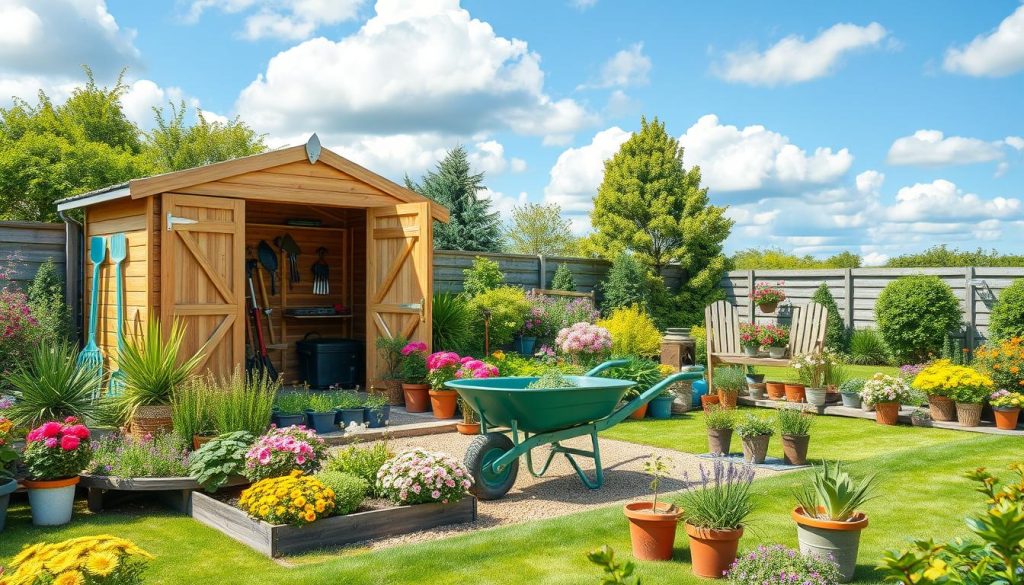Starting a landscaper business in the UK needs careful planning. You must research the market, legal stuff, and how to manage money. Making smart choices and being well-prepared is key to success. This guide will help new business owners understand the UK landscaping industry better.
Understanding the Landscaping Industry

The UK landscaping industry is changing fast, thanks to new trends. People now want eco-friendly designs, making sustainable landscaping popular. This not only helps the environment but also makes properties look better.
Current Trends in Landscaping
Recent trends in landscaping include:
- Vertical gardens that make the most of space and help nature.
- Automated irrigation systems that save water and keep gardens green.
- Native plant landscaping that needs less care and supports local wildlife.
These new ideas offer great chances for landscapers to grow their businesses.
Market Opportunities
There’s a big market for landscaping at home, with homeowners wanting unique outdoor areas. Companies are also investing in landscaping to look better. But, getting into this field has its challenges, like dealing with economic ups and downs and tough competition. To succeed, landscapers must stay flexible and keep an eye on the changing market.
Key Skills Required for a Successful Landscaper

To be a top landscaper, you need both technical and soft skills. These skills help you offer great service and manage projects and clients well. Always look for ways to improve and adapt to new trends in the industry to succeed.
Technical Skills
Technical skills are key for good landscaping. They include:
- Horticultural knowledge: Understanding plant biology, growth needs, and how to manage pests.
- Landscape design: Being good at creating beautiful and useful outdoor areas.
- Machinery operation: Using tools and equipment well for upkeep and setting up landscapes.
- Soil management: Knowing about soil types and how to make them better.
These skills are crucial for getting great results and keeping up high standards. Taking part in training and seminars can boost these skills even more.
Soft Skills
Soft skills in landscaping are also very important for working with clients and managing projects. Key soft skills are:
- Communication: Sharing ideas clearly and understanding what clients want.
- Project management: Organising and finishing tasks on time.
- Customer service: Making clients happy and building good relationships.
- Problem-solving: Dealing with problems quickly during projects.
Getting good at these soft skills makes you a successful landscaper. It helps you work well with clients and colleagues.
Creating a Business Plan for Your Landscaping Business

Creating a strong landscaping business plan is key to success. It helps you know your target market and set clear goals. By looking at different landscaping services, you can make your offerings match what clients want.
Business Model
Choosing the right business model is crucial for your landscaping plan’s success. Think about these options:
- Residential landscaping for homeowners.
- Commercial landscaping for businesses and public areas.
- Niche markets like sustainable landscaping or luxury gardens.
Each model has its own benefits and challenges. This affects how you run your landscaping business.
Financial Projections
Getting financial projections right is vital for planning your income and costs. Your business plan should have:
- Startup costs for equipment, licenses, and marketing.
- Revenue forecasts based on your pricing and market study.
- A break-even analysis to see when you’ll make a profit.
Using the right tools and templates helps make your financial projections accurate. This ensures your landscaping business can last and make money.
The Importance of Licensing and Certifications
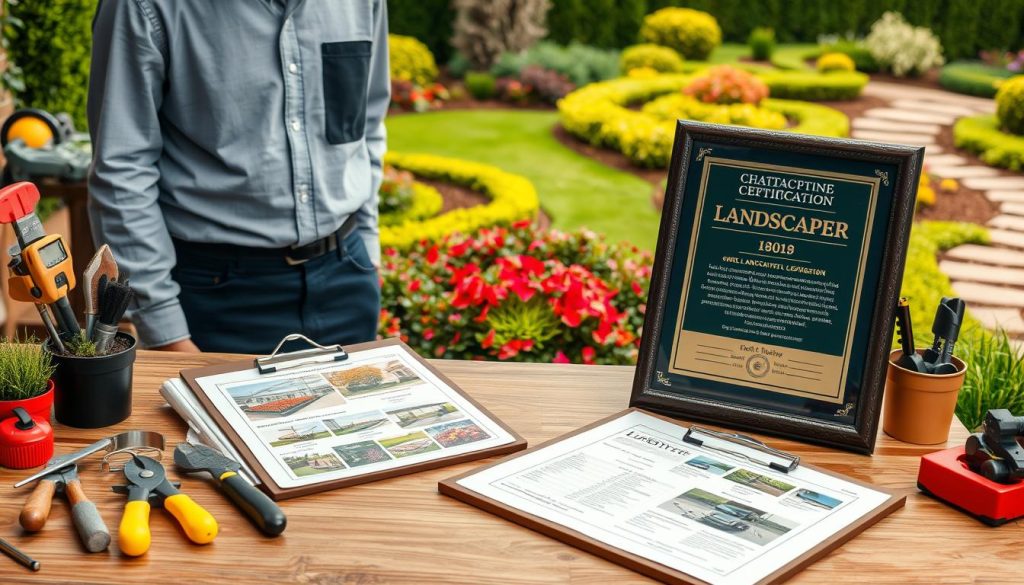
Starting a landscaping business means following the law, including getting the right licences and qualifications. In the UK, you need certain licences to work legally. This shows you’re serious and builds trust with customers.
Required Licences in the UK
Landscapers need to know about the UK licences they must have:
- Public Liability Insurance: This covers accidents or damage claims.
- Waste Carrier Licence: Needed for moving green waste and other materials.
- Pesticide Application Certification: For using chemicals to control pests.
Having these licences makes your business look legit. It builds trust with clients and others.
Benefits of Certification
Getting UK certifications, like those from BALI or City & Guilds, helps landscaping businesses a lot. These certifications bring many benefits, such as:
- Enhanced Customer Trust: They show you’re an expert and serious, making clients more likely to choose you.
- Competitive Advantage: You stand out more in a crowded market with these credentials.
- Access to Networking Opportunities: Certified landscapers can join special industry events and forums.
So, getting landscaping licences and UK certifications is key. It makes your business look good and follows professional standards.
Choosing the Right Niche in Landscaping

Finding the right landscaping niche is key to a successful business. Specialising in landscaping can help you meet market needs and boost profits. You can choose from residential, commercial, garden design, or eco-friendly landscaping. Each niche has its own benefits and challenges, offering chances for growth and connecting with clients.
Specialisation Options
Choosing a specialisation sharpens your skills and meets specific client needs. Here are some popular specialisations:
- Residential landscaping: Enhances home outdoor areas with gardens, patios, and walkways.
- Commercial landscaping: Designs and maintains business outdoor spaces for a professional look that draws in customers.
- Garden design: Focuses on the beauty and function of gardens, needing creativity and plant knowledge.
- Eco-friendly landscaping: Uses sustainable methods and native plants for environmentally friendly landscapes.
Retail vs. Commercial Landscaping
Retail and commercial landscaping cater to different markets. Retail landscaping targets homeowners, focusing on making spaces usable and beautiful. It’s driven by the trend towards outdoor living and personal gardens. Commercial landscaping works with businesses, creating spaces that reflect their brand and draw in customers. Both areas need special approaches and marketing.
Essential Equipment for Landscapers
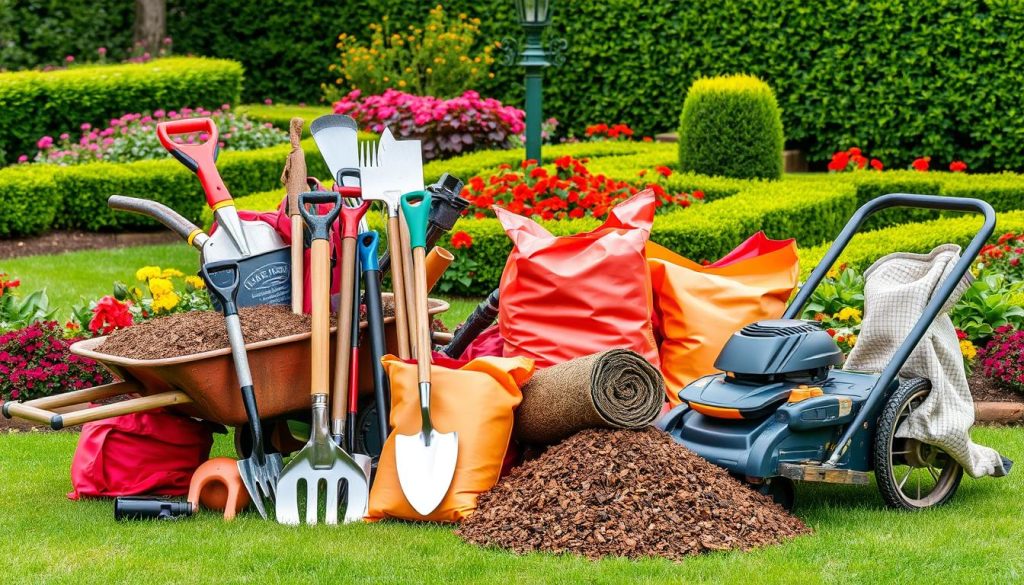
Effective landscape management needs the right equipment and tools. Choosing the right landscaping gear boosts efficiency and quality. It’s key for lawn care and landscape design in any professional setting.
Tools for Lawn Care
Starting a landscaping business begins with the basics for lawn care. Here are the must-haves:
- Lawnmowers – Essential for a neat lawn.
- Trimmers – Great for edging and details around plants and paths.
- Blowers – Good for removing leaves and debris, leaving a clean look.
- Fertilizer spreaders – Key for spreading nutrients evenly.
- Soil aerators – Boosts lawn health by letting air and water in.
Landscape Design Equipment
For landscape design, you need special tools. These help make your ideas real:
- CAD software – Vital for detailed landscape designs and layouts.
- Surveying equipment – Needed for precise land measurements before starting.
- Graphic tablets – Good for digital sketches and presentations.
- Plotter printers – Essential for large designs and plans.
- Hand tools – Tools like shovels, rakes, and trowels are always useful.
Buying durable and efficient landscaping gear is a must for landscapers. Keeping these tools well-maintained ensures they work well over time. This means better performance on every job.
Pricing Your Landscaping Services Effectively

Setting the right price for landscaping services is key to success. A smart pricing strategy means making a profit and drawing in clients. Knowing what to charge helps landscapers show their skills and keep customers happy.
Setting Competitive Rates
To set competitive rates, start by looking at what others charge. Check out what local landscapers offer and their prices. Here’s what to do next:
- Identify benchmark service rates in your locality.
- Evaluate the range of services offered by competitors.
- Assess the quality and reputation of competitors’ work.
Offering extra services can make your prices seem worth it. Tailoring services to what clients want makes your prices more appealing.
Factors Influencing Pricing
Many things affect how much you charge for landscaping. Important factors include:
- Where you are can change your costs, like for labour and materials.
- The services you offer can change how much time and resources you need, affecting price.
- The cost of materials can go up and down, impacting your pricing.
Using special tools like worksheets and calculators can help with pricing. Knowing what affects landscaping prices helps with smarter decisions and better money management.
Marketing Strategies for Your Landscaper Business
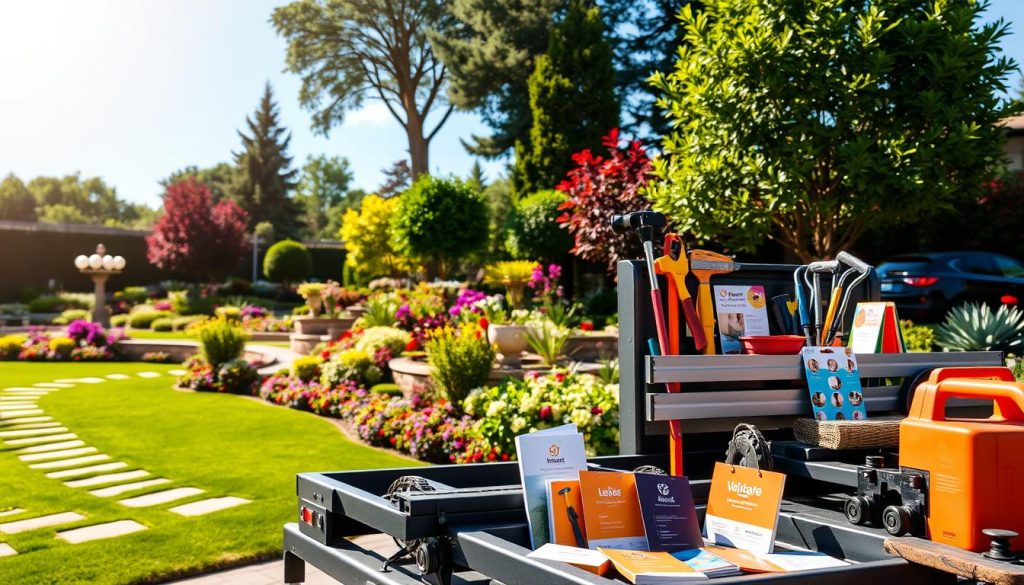
Effective marketing for landscapers means using both digital and traditional methods. It’s key to know how to use these to get more people to see your business and come to you for landscaping work.
Digital Marketing Techniques
Digital marketing helps landscapers reach more people. Key parts include:
- Social media marketing helps you talk to potential clients and show off your work.
- Search engine optimisation (SEO) makes your landscaping website easier to find online.
- Content marketing, like writing blogs and articles, shows you know your stuff and brings people to your site.
Local Advertising Approaches
Local ads are still a strong way to get your landscaping seen by people in your area. Think about these ideas:
- Being part of local events helps build relationships and gets your brand out there.
- Talking to other local businesses can lead to more work and partnerships.
- Events like free advice sessions or workshops can attract new customers and show off your skills.
Building Your Brand as a Landscaper

Creating a strong brand is key to doing well in landscaping. It means making a unique identity that speaks to potential clients and shows you’re professional. A clear brand identity boosts recognition and builds trust. With good branding, landscapers can stand out in a crowded market.
Brand Identity Development
Starting with brand identity means knowing who you want to reach. You need to understand their likes, needs, and what they expect. A catchy logo, a chosen colour scheme, and a consistent tone in all messages help make your brand clear.
It’s crucial that everything you show reflects the quality of your work. Using customised marketing stuff like brochures and business cards with these elements is key to making your brand strong.
Importance of Online Presence
Being visible online is crucial today. Online marketing lets landscapers reach more people. A professional website is a great way to show off what you do and share tips on landscaping.
Using social media helps you connect with potential clients and show off your work. Keeping your messages the same on all platforms builds trust and credibility.
Networking and Building Client Relationships
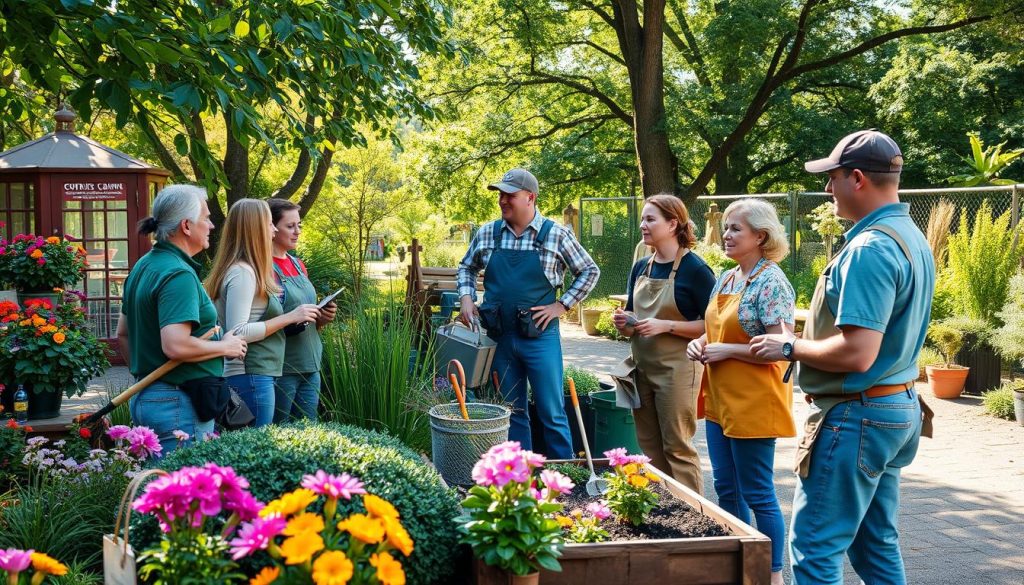
Networking is key for landscapers to grow and succeed. It helps connect with industry pros, suppliers, and potential clients. These connections build trust and boost your reputation, keeping clients coming back.
Importance of Networking
Networking can really change your business game. It leads to collaboration, sharing knowledge, and finding new resources. By linking up with others, landscapers learn about trends, tech, and best ways to work.
Events and forums are great for showing off your skills and services. This can draw in new clients. In landscaping, word-of-mouth is super important for getting ahead.
Client Retention Strategies
Keeping clients happy is key to keeping them around. Here are some tips to help:
- Give top-notch service that goes beyond what clients expect.
- Keep clients in the loop with clear communication.
- Check in after the job’s done to make sure they’re happy.
- Offer special deals for coming back.
- Listen to what clients say and make changes if needed.
Using these strategies can help landscapers keep clients and grow their business.
Effective Management of Your Landscaping Business

Running a landscaping business well means having a good plan for money and people. Using smart organisational strategies helps make the business more efficient and productive.
Financial Management
Managing money well is key to growing and making profits in landscaping. Owners should pay attention to these points:
- Keep track of spending and earnings.
- Use accounting software to make financial tasks easier.
- Set up budgets for each month and quarter to predict money flow.
- Invest in tools that give insights into how the business is doing financially.
These steps help make better decisions and prevent financial problems that could harm the business.
Staff Management Techniques
Managing a team well is crucial for a landscaping business to succeed. Important methods to think about include:
- Hire people who share the company’s values.
- Offer regular training to improve skills.
- Use a performance review system to motivate staff.
- Promote open communication for a team spirit.
By focusing on these team management strategies, landscaping businesses can create a united team focused on reaching goals.
Utilising Technology in the Landscaping Industry

Technology is changing the landscaping world, bringing new solutions that make things more efficient and creative. Using technology in landscaping is now key for modern work. It lets landscapers plan better and talk to clients with the help of software. Drones are also changing how we check sites and keep them up, giving us new views and data.
Landscape Design Software
Landscaping software makes designing easier, letting landscapers make detailed 3D models and pictures. Tools like SketchUp or AutoCAD Landscape Design have many benefits:
- They make designs more accurate with precise measurements.
- They help show ideas to clients with better visuals.
- They make working together in teams easier with cloud-based tools.
Using landscaping software helps businesses stay ahead and deliver better results.
Use of Drones and Automation
Drones are key in landscaping for quickly checking big areas. They give clear pictures and data on the land’s shape, plant health, and how it’s used. This cuts down the time and effort needed for checking sites.
Automation tools also make tasks like watering and keeping up with the landscape easier. They work with precision and save time. Automated watering systems use less water and keep plants healthy, showing how important technology is in landscaping.
Environmental Considerations in Landscaping

In today’s landscaping world, looking after the environment is key. Landscapers now see the worth in sustainable landscaping and eco-friendly ways. These methods help the planet and draw in customers who care about the planet. It’s vital to know how to use these practices and follow environmental laws.
Sustainable Practices
Sustainable landscaping uses many techniques to save resources and lessen harm to the environment. Some top sustainable practices are:
- Using native plants that need less water and care.
- Setting up rainwater systems to use water better.
- Picking organic fertilisers and pest control to keep soil healthy.
- Adding mulch to keep soil moist and cut down on weeds.
Environmental Regulations
Landscapers in the UK must follow many environmental laws to act responsibly. Sticking to these laws keeps a business’s good name. Important environmental laws include:
- The Wildlife and Countryside Act, which protects certain species and places.
- Local rules on waste management and recycling.
- Rules for using pesticides and herbicides to protect other animals.
Expanding Your Landscaping Business
The landscaping industry is growing, offering great chances for your business to expand. By using smart growth strategies, you can offer more services and reach new areas. This approach helps increase profits and makes your brand more known in the community.
Growth Strategies
Expanding your landscaping business means looking closely at what people in your area need and want. Adding services like garden upkeep or designing outdoor spaces can draw in more customers. Also, moving into new areas can expose your work to different customers, giving you more ways to make money.
Working with local architects or builders can lead to new projects. This keeps your business busy and makes you more visible in the market.
Diversification Opportunities
Adding different services is key to growing your landscaping business. Offering things like snow removal or decorating for holidays can bring in money when it’s slow. Teaming up with businesses like plant nurseries or outdoor furniture sellers can make your services better and give customers a full experience.
Stories from successful landscapers show how these strategies can help your business grow and last.

